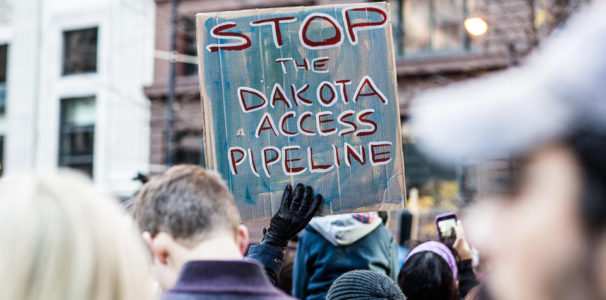
CHICAGO, Nov. 12th — In an act of solidarity, thousands gathered at Chicago’s Dirksen Federal Building Saturday, where indigenous organizers and allies came together in opposition to the Dakota Access Pipeline (DAPL). The Sacred Stone Camp and Indigenous Environmental Network live streamed the action, which included a celebration of indigenous resiliency with a traditional Snake Dance.
The crowd followed along in a 2-step style dance that all were invited to participate in. The ceremony also included Pow-Wow drummers, singers and dancers, and several prayers and rituals from community members. Janie Pochel, one of the leading organizers of the rally, is Lakota and Cree and an advisor for the Chi-Nations Youth Council, an all-Native youth organization based in Chicago. She noted that the rally, much like the vibrant struggles across the city, is led “by young people.”
Keeping young activists mobilized has become a critical tactic for the movement against the Dakota Access Pipeline. Just last month indigenous youth occupied Hillary Clinton’s headquarters in Brooklyn, NY to oppose the $3.8 billion oil pipeline project.
Young organizers were not the only ones present at the Chicago event: organizers reported that allies also showed up en masse, filling the street with banners and signs. “It was really amazing for me to see all those faces who are standing up with indigenous people as we continue the fight to protect the land and water for the future generations,” said Pochel. “The crowd was full of energy, we had a constant prayer throughout the whole event and that contributed to the feeling of unity.” Even former Illinois governor Pat Quinn made an appearance.
The water protectors who are camped out in opposition to the DAPL at Standing Rock, North Dakota have had a particularly difficult month. They have continued to face off against police forces at the pipeline site. According to the Facebook event page, once completed, the Dakota Access pipeline will run across approximately 1,172 miles of land from North Dakota to Illinois. The DAPL will transfer crude oil, estimated to be between 470,000 to 570,000 barrels a day or more, through the Oglala Aquifer, as well as, under the Big Sioux, Missouri and Mississippi Rivers. Energy Transfer Partners, the pipeline’s parent company, has already achieved 100 percent completion of the Dakota Access Pipeline in Illinois, and South Dakota. The water protectors’ resistance in North Dakota and Iowa are the last remaining lines of defense against DAPL.
It is a resistance that is getting results. On Monday, the US Department of the Army said it is holding off on easements under the Missouri River for the Dakota Access Pipeline (DAPL) and halting construction pending further review. Standing Rock Sioux Tribal Chairman Dave Archambault II told reporters: “We are encouraged and know that the peaceful prayer and demonstration at Standing Rock have powerfully brought to light the unjust narrative suffered by tribal nations and Native Americans across the country.”

For many in Chicago, being present at the rally was about reiterating the message of urgency, “we all realize the importance of clean drinking water because we need water to live. No exceptions.” said Patrick Del Percio, who volunteers his time as a Cherokee language translator/instructor at the American Indian Association of Illinois. “It was important to show up and stand with my Indigenous community and our allies to show the world that we are not backing down from this fight and we will work hard to ensure that our future generations inherit an Earth that they can thrive on.”
In addition to Saturday’s event, Chicago is also holding a NoDAPL Day of Action today, Tuesday November 15th at the Loop’s Daley Plaza, organized by Save Our Illinois Land (SOIL). As with the Snake Dance rally, the event seeks to “call upon President Obama to instruct the Army Corps of Engineers to revoke the permits for this dirty oil pipeline.” Sarina DiMaso, an independent consultant and community organizer with the American Indian Center, is one of the featured speakers at the event. “We’ve been oppressed for hundred of years,” she said. “But this time around we’re going to be smarter. We are going to get everyone involved, we are going to win this fight and we are going to stop this pipeline dead in its tracks.” DiMaso, who is Chiricahua Apache and Taino, has worked with indigenous communities for years and was part of the first Native theater collective based out of Truman College. She has now redirected her efforts into activism and social education. “We’re getting bigger,” said DiMaso. “We are not just going to stop at this pipeline – we have so many other things we want to do, environmental justice, native curriculum in schools, education of youth. Our priority is pipeline, but it does not end there.”
In the meantime, Chicagoans continue to push back and mobilize against the capitalist imperialism of pipeline infrastructures. During this particularly dark, post election, period many have found comfort and empowerment in the unified struggle against the forces of oppression that have long silenced marginalized voices. Whether it be rallying against environmental contamination, the incoming President-elect, or for basic human rights, the masses are coming together in a fast-growing movement for change.










